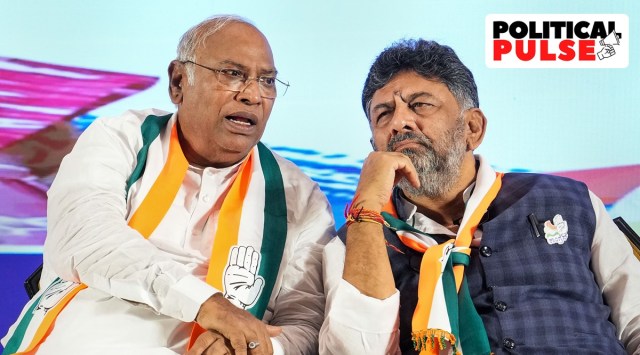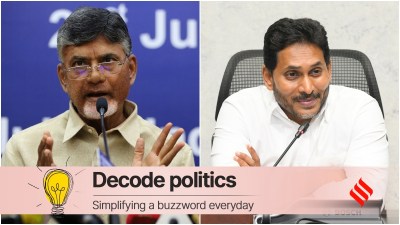A cautious line on reinstating the old pension scheme (OPS), silence on the hijab ban imposed in pre-university colleges in the state, promise to increase reservations for SCs, STs, OBCs, Lingayat and Vokkaliga communities, restoration of 4% quota for Muslims, and imposition of a ban on the Bajrang Dal — the Congress manifesto for Karnataka is an interesting mix of both adhering to and nuancing of its past positions, as well as another push to its aggressive social justice outreach.
Apart from the five “guarantees” that the Congress has been aggressively pitching in the state, the manifesto also talks about enacting a special law to punish the perpetrators of corruption — the “40 per cent commission sarkara” charge against the Basavaraj Bommai government is the party’s main campaign pitch — and repealing all “unjust laws and other anti-people laws passed by the BJP government”, within one year of coming to power.

The OPS approach in the manifesto is strikingly different from, say, the recent Assembly elections in Himachal Pradesh, where the party emphatically promised junking the New Pension Scheme (NPS) and listed it as the first of its 10 guarantees to the people. The OPS promise is believed to have been one of the prime reasons behind the Congress’s win in the state, with the Sukhvinder Singh Sukhu government restoring the OPS in the first Cabinet meeting, as promised.
The Congress governments in Rajasthan and Chhattisgarh too have already reinstated the OPS.
The Karnataka Congress document, though, merely says the party will “sympathetically consider extension of OPS to the pensionable government employees who joined service since 2006”.
The Congress’s promise of a crackdown on radical outfits spreading “hatred”, naming the Bajrang Dal and Popular Front of India (PFI) in particular, comes against the backdrop of the BJP accusing the previous Siddaramaiah-led Congress government of being “soft” on the PFI.
The manifesto says: “We believe that the law and Constitution are sacrosanct and cannot be violated by individuals and organisations like the Bajrang Dal, PFI or others promoting enmity or hatred whether among majority or minority communities. We will take decisive action as per law including imposing a ban on any such organisations.”
Story continues below this ad
While this mention of the PFI and Bajrang Dal in the same breath is a retort to the BJP’s campaign, the Congress’s position on the Bajrang Dal is not new.
In 1998, following its Vichar Manthan Shivir in Pachmarhi, the Congress had issued a “resolve” saying it will “unflinchingly meet the challenge of the communal forces as represented by the BJP and its associates in the Sangh Parivar, such as the RSS, the VHP and the Bajrang Dal, and those outside, such as the Shiv Sena, with no compromise or dilution of the well-established principles and practice of secularism, defined and evolved by the party as crucial to our nationhood”.
The Shiv Sena, though, is now an ally of the Congress.
Then there are some silences.
While the manifesto in the section “religious minorities” accuses the BJP government of “indulging in minority bashing for political polarization to grab power”, it does not specify whether the Congress, if voted to power, will revoke the ban on wearing hijab in pre-university colleges. Interestingly, both Rahul Gandhi and Priyanka Gandhi Vadra have spoken against this in the past.
Story continues below this ad
“Whether it is a bikini, a ghoonghat, a pair of jeans or a hijab, it is a woman’s right to decide what she wants to wear” as “this right is guaranteed by the Indian constitution,” Priyaka had said in a Twitter post in February last year.
Rahul had tweeted on the controversy on Saraswati Puja day, saying “by letting students’ hijab come in the way of their education, we are robbing the future of the daughters of India. Ma Saraswati gives knowledge to all. She doesn’t differentiate.”
Karnataka leaders, especially Siddaramaiah, too have slammed the state government measure on hijab, arguing that preventing Muslim students in headscarves from entering their institutions was an attempt to rob girls of their fundamental right to education.
The party’s promise to increase reservations and raise the ceiling from 50% to 75% of government posts and jobs, to “accommodate the hopes and aspirations of SC/ST/OBC/minority and other communities like Lingayats and Vokkaligas”, is in line with Rahul’s recent statements demanding more reservation for OBCs, even if breaching the 50% quota cap.
Story continues below this ad
Interestingly, the manifesto also has an entire section titled “Temples and Pilgrim centres”, with promises like setting up of a “Dharmika Nidhi” fund of Rs 1,000 crore for restoration and renovation of minor temples and mutts across the state, assistance of another Rs 1,000 crore to upgrade facilities of smaller village-level mutts and temples, and provision of Rs 5,000 honorarium per month to priests of temples, mosques, churches who are above 60 years of age.
This is similar in promise to what the BJP has said in its manifesto.

































